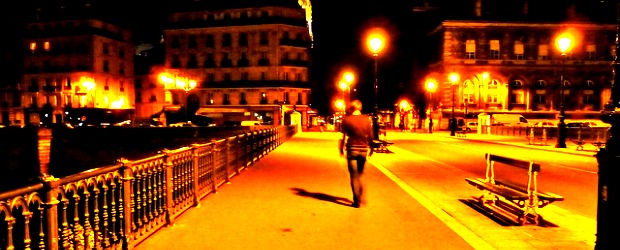You have no items in your cart. Want to get some nice things?
Go shopping
The exchange rate hit you harder than expected and you’ve been pinching Euros with enough force to make the Vitruvian Man gasp for air and cry mercy. Hell, you might have even broken one of his silver ribs. But tonight, your insides are screaming for outside and not even holed pockets can hold you back.
It’s been two weeks in Paris and you’ve made a few friends, but most days are spent alone wandering through museums and drinking espressos in orange-lit cafes, or reading or writing or drawing, and sometimes visiting galleries. You met a Moroccan-born girl with beautiful brown symmetrical lips and made hesitant plans for this evening, but you forgot to call her yesterday to confirm and now she’s made other arrangements. You’re not sad, not even lonely, but you can’t stay in again. Not tonight.
You descend the white-marble spiral staircase of the apartment that was lent to you by a friend, out onto Rue Dauphine in the pricey and sophisticated 6th Arrondissement. You walk past the usual groups of well-dressed, attractive people finger-picking mussels from large pots and drinking red wine, past Taschen Books where you often go to flip through a giant biography of Mohammed Ali and wish you were him, past the gelato shop with the long line stretched onto the sidewalk, and finally hook a left at Paul’s Baguettes on the corner. The grocery store is still awake and tonight you’ll need two bottles (small bottles) of Shiraz, and hey, why not a bag of chips?
You have no plan really, other than to walk and drink your wine. You can do that in Paris, this culture-soaked metropolis where street vendors sell old brown-stained copies of Nietzsche and Apollinaire wrapped in clear plastic and the State permits its citizens the liberty to stroll down the rue with a drink in hand as if they are mature adults. You haven’t taken advantage of this liberty yet because you know you’ll think people are judging you, calling you wino or idiot or dumb American and you won’t even realize it because you don’t speak French, which will only make you feel more like a wino, idiot, and/or dumb American—and if that doesn’t happen you imagine the French police will suddenly change their minds about their complacent public drinking laws and commence to beating you over the head with stale baguettes—and you couldn’t stand to go back home after having your ass kicked by Frenchmen in berets wielding long, hard loaves of bread. But tonight, you’re in the mood for judging, not for being judged—so the hell with men in berets with baguettes, you think.
You replace your self-doubt with the airs of a confident swagger as you twist the cap off the first bottle of wine and saunter through the Latin Quarter—its bustling alleys, its myriad of bars and restaurants with their owners and waiters shouting in every tongue to every sort of tourist, beckoning them inside for an expensive meal. Burgundy reflections of wine against the orange glow of street lamps and endless amounts of beautiful people to watch—lips, eyes, cheeks, collarbones, hands—hover in mist and mingle with the city’s cloudy silence. All of the faces and skins seem wanting and lustful.
Ah, Paris! What a wonderful place to be rich. You could indulge each night at an overpriced restaurant, leave big tips until the waiters know you by name and smile when they see you coming. You could meet a pretty girl in a gallery and buy her fancy wines and crème brûlée and all sorts of shit you can’t pronounce or spell without a dictionary. You could take romantic boat trips down La Seine and wave excitedly as you pass locals on the bank in a manner not so different from the way the tourists wave excitedly at Six Flags Zoo when the red-assed monkeys feel inclined to come down from the trees and climb on cars.
But you are not rich (not even close), and as your wandering imagination fades towards self-pity you see an old, grey-haired homeless man reaching into the garbage. He pulls out a McDonald’s cup and takes a long, hard sip from the straw. You hear the last remnants of fructose corn syrup being greedily sucked and swished into his mouth. And though you’d like to give him water or juice or something to drink, all you have is wine tonight, and you’re just not that great of a philanthropist.
Around this time you have an idea. It is 9:26 p.m. and the Eiffel Tower will sparkle at precisely 10 p.m. Last night you saw it for the first time from a friend’s balcony on the 27th floor in an apartment on the outskirts of the city centre. It was magic. And tonight, you decide, you want to be directly under it when it commences its illuminative dance. Whether you can make it the four or five kilometres from the Latin Quarter to the Eiffel Tower in thirty minutes you know not, but you have already been narrating this journey in your head, and like a foolish writer you think the trip could at the very least give this lonely journey of the soul some narrative arc.
So you set out. At first maintaining a casual pace and taking small swigs of wine. Watching the couples stride by holding hands, a practice that as of late you think should be illegal, at least on tiny sidewalks and in the presence of single people. Along the Left Bank overlooking La Seine, you hear a jazz band playing. You look down and see large groups of friends with wine and cheese and all sorts of French clichés enjoying the music and soft air of the last night of August. You have purpose now. And with purpose added to the mix the music is soothing and the wine tastes good and it’s nice to be alone along this river so far from home with nothing but rambling thoughts and a dream of the Eiffel Tower.
After losing yourself in the rhythms of your own feet, you look down at your watch. It is now 9:42 and you’re not even half way there. How sad it would be to go all that way and miss the lights. But if you’re going to have any shot at making it before ten, you know you need to run. So you begin to jog. You played high school basketball. They even made you run cross-country one year. You were the fifth best runner on the team. But this is the first time you’ve mixed wine-drinking and exercise, so it will be a challenge, no doubt.
You jog past a well-lit café where scholarly-types sip tiny cups of coffee and lovely long-legged ladies wrap their smooth fingers around big bellied glasses of merlot, all of them cross-legged on the terrace watching the street as though at some undetermined moment a movie will begin. They watch you as you glide past in a well-paced jog. There are other joggers out this late, and plenty of drinkers, but you appear to be the only one doing both. They must admire your versatility, you think.
It is now 9:50 and you need a break. You have just past Musée d’Orsay and you estimate that you’re still a twenty minute walk from the Eiffel Tower. You have a swig of wine and wish it was water. You wonder if Jesus could turn wine back into water and you think that that would be a much more Christian thing to do.
It’s 9:52 and a sudden burst of energy surges through you. You sprint. You run across avenues and exceptionally wide streets even when the little green man refuses his approval. The hell with the little green man, you think, he only walks when there’s no threat of danger. He’s a coward. He never would have come to Paris alone.
You have five minutes to get there and you wonder why you are the only one on the street running. Don’t they know? Don’t they know it’s going to sparkle?
You can see it now, an enormous golden point protruding into the dark. You are so close you have to make it and you hope your watch is a few minutes fast. But as you round the bend of another museum you look up and there it is, sparkling, dancing in the night. For a moment you resign yourself to watch it there. It’s magnificent.
But you remember your friend told you that it lights up for five minutes—so you begin to sprint, really sprint, Usain Bolt type sprint. You weave through groups of sidewalk lurkers like a skinny drunken tailback. You hop a flower patch, a bush, and the tiny fence that leads into the park. People must think you’re running from the police—and suddenly, there you are, under the Eiffel Tower.
And the lights are still dancing diamonds. And it looks like stars, or the silver eyes of celestial fish, swimming through a golden waterfall that falls upwards and narrows to a point in the sky; a sparkling arrow aimed at the black void of night. And in all your exhaustion, joy-chills vibrate through your veins and skin like electric currents, even though you are so sore from the mad dash your neck strains just to look up.
And then it stops. And you smile. And you know that you’ve made it. And you know you’ve got a bottle of wine left, and a bag of chips, and a pen and paper and even a little blanket you packed just in case.
You will lie in the grass and marvel at the Eiffel Tower for the next hour until it, as it does every hour on the hour, flashes its diamond-dotted dress again.
And for the first time this evening, you realize you’re in Paris on a summer night, and you have everything you need.

About Nathaniel Kostar
Nathaniel Kostar lives in New Orleans where he fronts a rock/blues/funk hip-hop band called Tha Neighbors, studies poetry at The University of New Orleans, and is working on completing The Renaissance Man Project--a life project and eventual book that will detail his journey as he attempts to travel to six different countries around the globe and study the skills that were expected of Italian Renaissance Men. So far the project has taken him to Dorf Tyrol, Italy for poetry, Phuket, Thailand for Muay Thai boxing, Paris for visual art, and New Orleans for music. He regularly writes for Burlesque Press.

